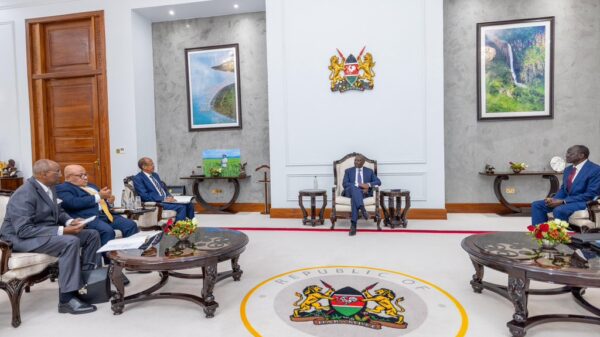 NAIROBI, Kenya, Feb 7 – State Officers will be allowed to continue operating overseas bank accounts but only after they get clearance from relevant commissions, under proposals contained in the draft Leadership and Integrity Bill, 2012.
NAIROBI, Kenya, Feb 7 – State Officers will be allowed to continue operating overseas bank accounts but only after they get clearance from relevant commissions, under proposals contained in the draft Leadership and Integrity Bill, 2012.
The officers will either be required to get clearance from the Independent Electoral and Boundaries Commission, the Judicial Service Commission or the joint committee of the National Assembly and the Senate.
The Bill expects such officers to provide detailed information relating to the overseas accounts including the account name, number in addition to the type, and bars them from holding nominee accounts.
Justice Permanent Secretary Gichira Kibara however said that the Bill was still undergoing internal review and that all the emerging issues would be ironed out before it was eventually forwarded to the Cabinet.
“We will look at the comments that have been made then revise the Bill before we circulate it to the stakeholders. Once we get their final comments, we will have a roundtable with the Commission for the Implementation of the Constitution and then take it to Cabinet,” he explained on Tuesday.
Kibara, who spoke after attending a workshop reviewing the Bill, also said that there was need to have a transitional clause for State Officers who already held overseas accounts, if the particular Article was scrapped.
According the Constitution, a State Officer shall not maintain a bank account outside Kenya except in accordance with an Act of Parliament. However some of the participants at the forum argued that the restriction bore economic repercussions on the country. Read related story here.
“Some of those countries that host Kenyans’ bank accounts could also decide to pull the same move on us and advise their citizens to close any accounts they have in Kenya,” argued one of the contributors.
The Bill further places the Ethics and Anti Corruption Commission (EACC) as the overall enforcer of the law and requires other commissions including the Judicial Service Commission (JSC) to report to it on matters of leadership.
“The only thing we were trying to confirm is whether the EACC will be the one to deal with all the disciplinary issues or if they will be dealt with by the other commissions like the Public Service Commission,” he said.
“We have however agreed that the best thing would be to state that the EACC is the body to deal with leadership issues through out,” he explained.
The joint committee of the National Assembly and the Senate shall be responsible for the ethical issues of among others the President, Deputy Prime Minister, Cabinet Secretaries and Attorney General Members of Parliament, DPP, Auditor General, plus members and secretaries of constitutional commissions.
The Independent Electoral and Boundaries Commission (IEBC) shall be responsible for the ethics of the County Assembly members together with election officials while the JSC shall be charged with the ethical question surrounding Judges.
Kibara however said that there would be no duplication of roles as every player would have clear-cut roles.
“For instance the JSC will still carry on with its mandate so there shall be nothing like interfering with each others’ mandates or overstepping responsibilities. But we are still working on these things,” he said.
The proposed legislation also requires State Officers to declare their income, together with that of their spouses and children under 18, at the end of every two years.
It also gives State Officers who cease holding their respective positions 30 days to submit their final declaration of income.
Kibara however noted that the Bill must clearly state how some of the proposed provisions would be realised in order to shed light on the grey areas.
“We need to know how State Officers who contravene the law will be punished. For instance if there is a provision for stepping aside we need to know what it means and how we will deal with it,” he argued.
He added that there was need to cross reference the proposed Bill with the Elections Act as well as the Political Parties Act in order to help facilitate its implementation.
The chairman of the Commission for Administrative Justice Otiende Amollo had earlier said that his team had embarked on setting up modalities that would ensure State Officers did not hold overseas bank accounts.
Amollo said the Ombudsman had already met with Central Bank Governor, Njuguna Ndung’u, over how to monitor and effect the controls.
Although he noted that the Constitution placed strict restrictions on the management of overseas bank accounts by State officers, Amollo observed that there was need to set up a law to guide the requirement.
“We want to find out how we will ensure that State Officers do not hold bank accounts outside the country and we also need to find out how we can use legislation to make exemptions because as long as we don’t have such a law, all such accounts are illegal,” he argued.
He also said that his commission would on Thursday meet Immigration Minister Otieno Kajwang, on structures that would ensure State Officers did not hold dual citizenship, as set out by the Constitution.
The Ombudsman has also met Chief Justice, Willy Mutunga, over how to hold judicial officers to account, without undermining the role of the JSC.
“We have also held a meeting with the Chief Justice on how we will work with the JSC when the public complains to us about judicial officers while the JSC also has the power to deal with disciplinary issues. We need to know how to relate so that we don’t replicate the tasks,” he observed.


































